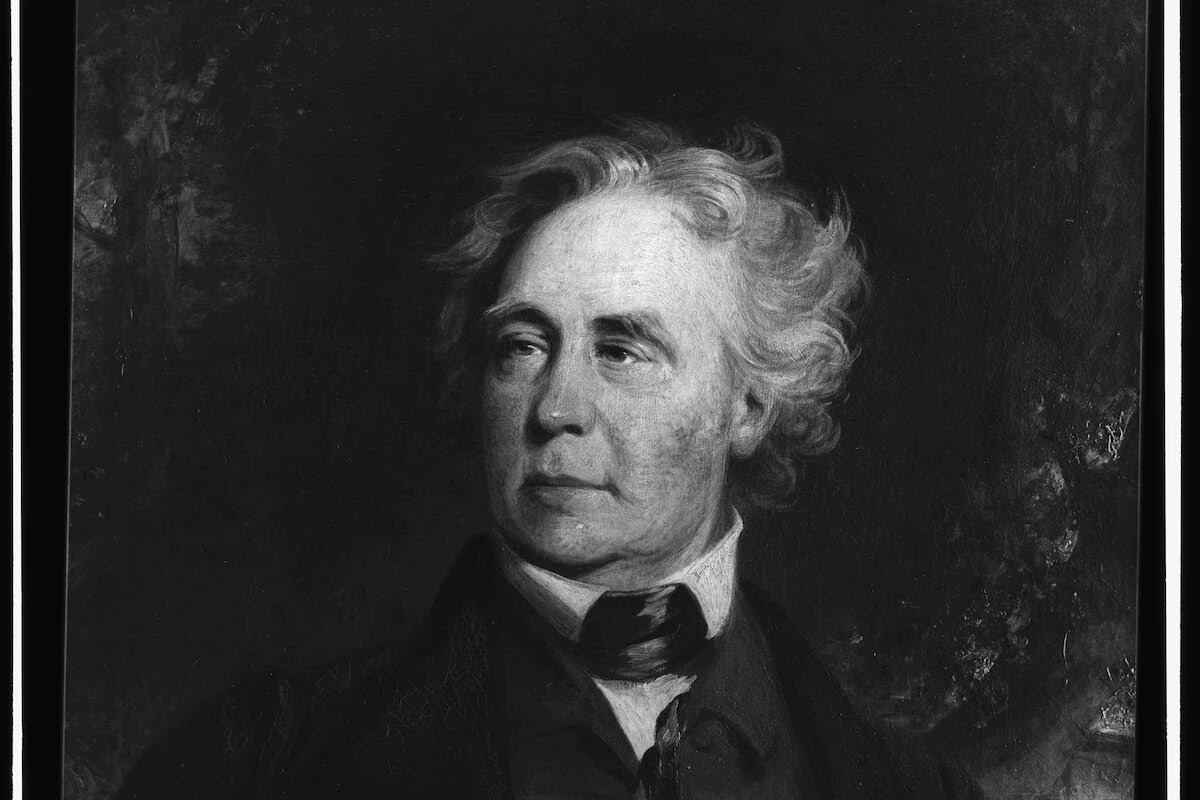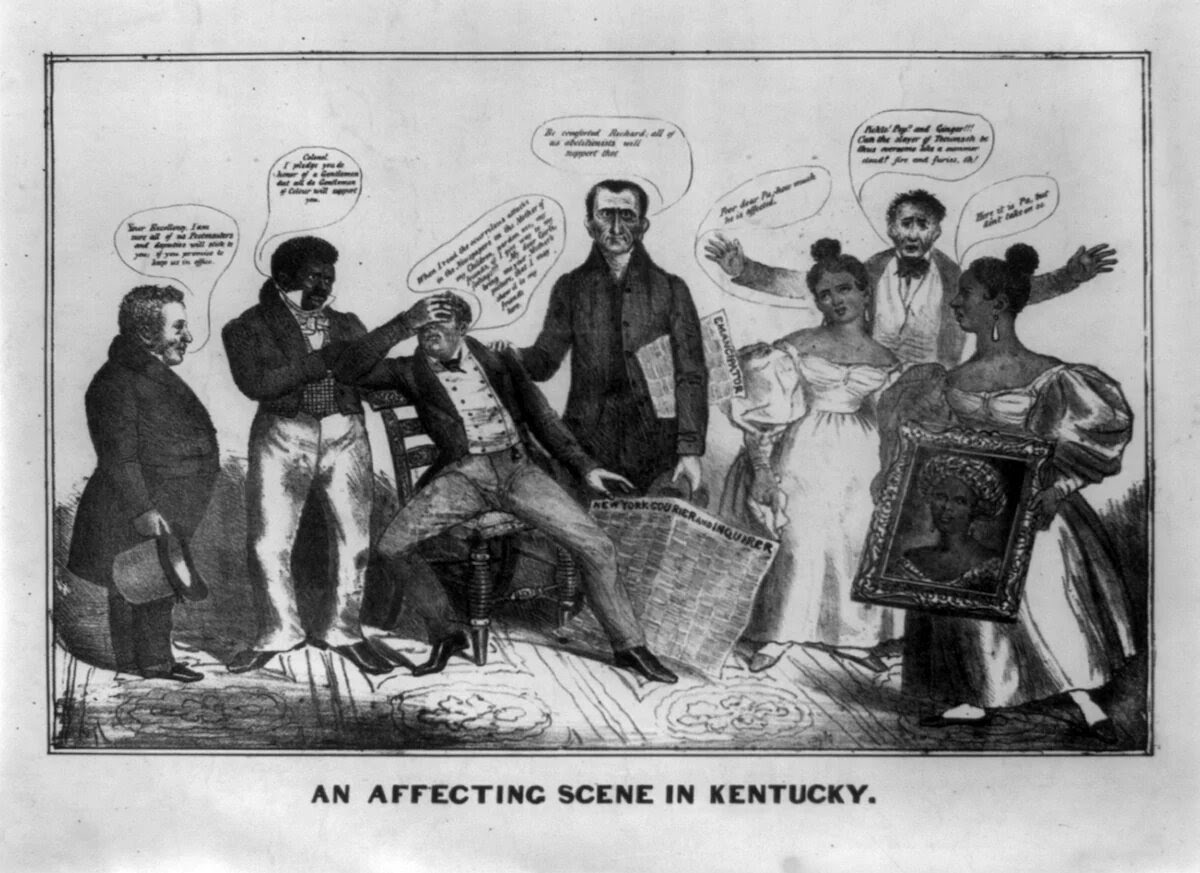The Nation’s Ninth Vice President Enslaved Wife:Her name was Julia Chinn, and her role in Richard Mentor Johnson’s life caused a furor when the Kentucky Democrat was chosen as Martin Van Buren’s running mate in 1836.

Richard Mentor Johnson became vice president in 1837. (Library of Congress)
She was born enslaved and remained that way her entire life, even after she became Richard Mentor Johnson’s “bride.”
Johnson, a Kentucky congressman who eventually became the nation’s ninth vice president in 1837, couldn’t legally marry Julia Chinn. Instead the couple exchanged vows at a local church with a wedding celebration organized by the enslaved people at his family’s plantation in Great Crossing, according to Miriam Biskin, who wrote about Chinn decades ago.
Chinn died nearly four years before Johnson took office. But because of controversy over her, Johnson is the only vice president in American history who failed to receive enough electoral votes to be elected. The Senate voted him into office.
The couple’s story is complicated and fraught, historians say. As an enslaved woman, Chinn could not consent to a relationship, and there’s no record of how she regarded him. Though she wrote to Johnson during his lengthy absences from Kentucky, the letters didn’t survive.
Amrita Chakrabarti Myers, who is working on a book about Chinn, wrote about the hurdles in a blog post for the Association of Black Women Historians.
“While doing my research, I was struck by how Julia had been erased from the history books,” wrote Myers, a history professor at Indiana University. “Nobody knew who she was. The truth is that Julia (and Richard) are both victims of legacies of enslavement, interracial sex, and silence around black women’s histories.”

Johnson’s life is far better documented.
He was elected as a Democrat to the state legislature in 1802 and to Congress in 1806. The folksy, handsome Kentuckian gained a reputation as a champion of the common man.
Back home in Great Crossing, he fathered a child with a local seamstress, but didn’t marry her when his parents objected, according to the biography “The Life and Times of Colonel Richard M. Johnson of Kentucky.” Then, in about 1811, Johnson, 31, turned to Chinn, 21, who had been enslaved at Blue Spring Plantation since childhood.
Johnson called Chinn “my bride.” His “great pleasure was to sit by the fireplace and listen to Julia as she played on the pianoforte,” Biskin wrote in her account.
The couple soon had two daughters, Imogene and Adaline. Johnson gave his daughters his last name and openly raised them as his children.
Johnson became a national hero during the War of 1812. At the Battle of the Thames in Canada, he led a horseback attack on the British and their Native American allies. He was shot five times but kept fighting. During the battle, the Shawnee chief Tecumseh was killed.
The Enslaved Wife To The Nation’s Ninth Vice President
In 1819, “Colonel Dick” was elected to the U.S. Senate. When he was away in Washington for long periods, he left Chinn in charge of the 2,000-acre plantation and told his White employees that they should “act with the same propriety as if I were home.”
Chinn’s status was unique.
While enslaved women wore simple cotton dresses, Chinn’s wardrobe “included fancy dresses that turned heads when Richard hosted parties,” Christina Snyder wrote in her book “Great Crossings: Indians, Settlers & Slaves in the Age of Jackson.”
In 1825, Chinn and Johnson hosted the Marquis de Lafayette during his return to America.
The Nation’s Ninth Vice President Enslaved Wife
In the mid-1820s, Johnson opened on his plantation the Choctaw Academy, a federally funded boarding school for Native Americans. He hired a local Baptist minister as director. Chinn ran the academy’s medical ward.
“Julia is as good as one half the physicians, where the complaint is not dangerous,” Johnson wrote in a letter. He paid the academy’s director extra to educate their daughters “for a future as free women.”
Johnson tried to advance his daughters in local society, and both would later marry White men. But when he spoke at a local July Fourth celebration, the Lexington Observer reported, prominent White citizens wouldn’t let Adaline sit with them in the pavilion. Johnson sent his daughter to his carriage, rushed through his speech and then angrily drove away.
When Johnson’s father died, he willed ownership of Chinn to his son. He never freed his common-law wife.
“Whatever power Chinn had was dependent on the will and the whims of a White man who legally owned her,” Snyder wrote.
Then, in 1833, Chinn died of cholera. It’s unclear where she is buried.
Johnson went on to even greater national prominence.
In 1836, President Andrew Jackson backed Vice President Martin Van Buren as his successor. At Jackson’s urging, Van Buren — a fancy dresser who had never fought in war — picked war hero Johnson as his running mate. Nobody knew how the Shawnees’ chief was slain in the War of 1812, but Johnson’s campaign slogan was, “Rumpsey, Dumpsey. Johnson Killed Tecumseh.”
Johnson’s relationship with Chinn became a campaign issue. Southern newspapers denounced him as “the great Amalgamationist.” A mocking cartoon showed a distraught Johnson with a hand over his face bewailing “the scurrilous attacks on the Mother of my Children.”

This political cartoon was a racist attack on Johnson because of his relationship with Julia Chinn. (Library of Congress)
The Nation’s Ninth Vice President Enslaved Wife
Van Buren won the election, but Johnson’s 147 electoral votes were one short of what he needed to be elected. Virginia’s electors refused to vote for him. It was the only time Congress chose a vice president.
When Van Buren ran for reelection in 1840, Democrats declined to nominate Johnson at their Baltimore convention. It is the only time a party didn’t pick any vice-presidential candidate. The spelling-challenged Jackson warned that Johnson would be a “dead wait” on the ticket.
“Old Dick” still ended up being the leading choice and campaigned around the country wearing his trademark red vest. But Van Buren lost to Johnson’s former commanding officer, Gen. William Henry Harrison.
Johnson never remarried, but he reportedly had sexual relationships with other enslaved women who couldn’t consent to them. The former vice president won a final election to the Kentucky legislature in 1850, but died a short time later at the age of 70.
His brothers laid claim to his estate at the expense of his surviving daughter, Imogene, who was married to a White man named Daniel Pence.
“At some point in the early twentieth century,” Myers wrote, “perhaps because of heightened fears of racism during the Jim Crow era, members of Imogene Johnson Pence’s line, already living as white people, chose to stop telling their children that they were descended from Richard Mentor Johnson … and his black wife. It wasn’t until the late 20th century that younger Pences, by then already in their 40s, 50s, and 60s, began discovering the truth of their heritage.”
Ronald G. Shafer is a former editor at the Wall Street Journal and the author of “The Carnival Campaign: How The Rollicking 1840 Campaign of Tippecanoe and Tyler Too Changed Presidential Elections Forever.”







